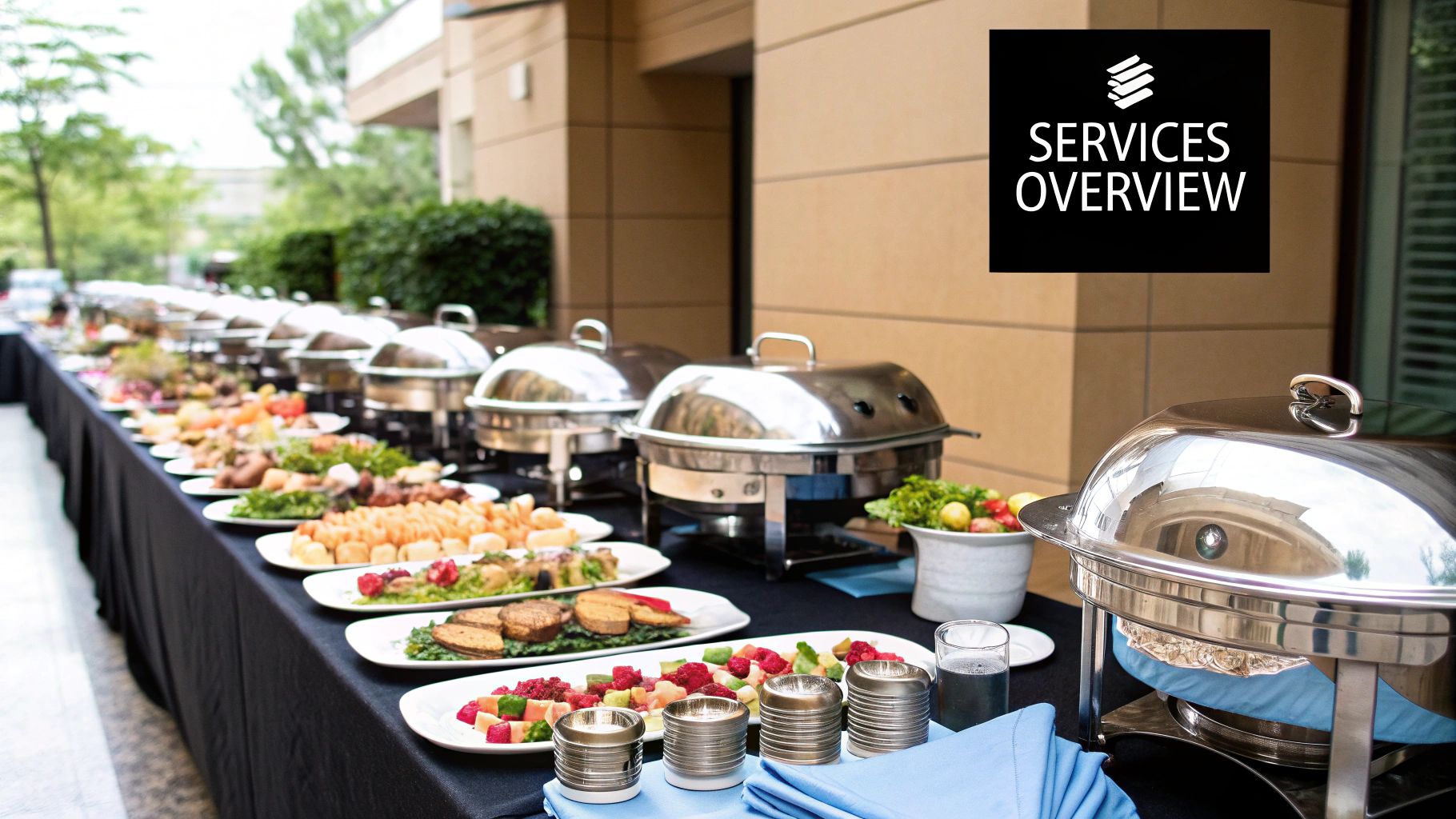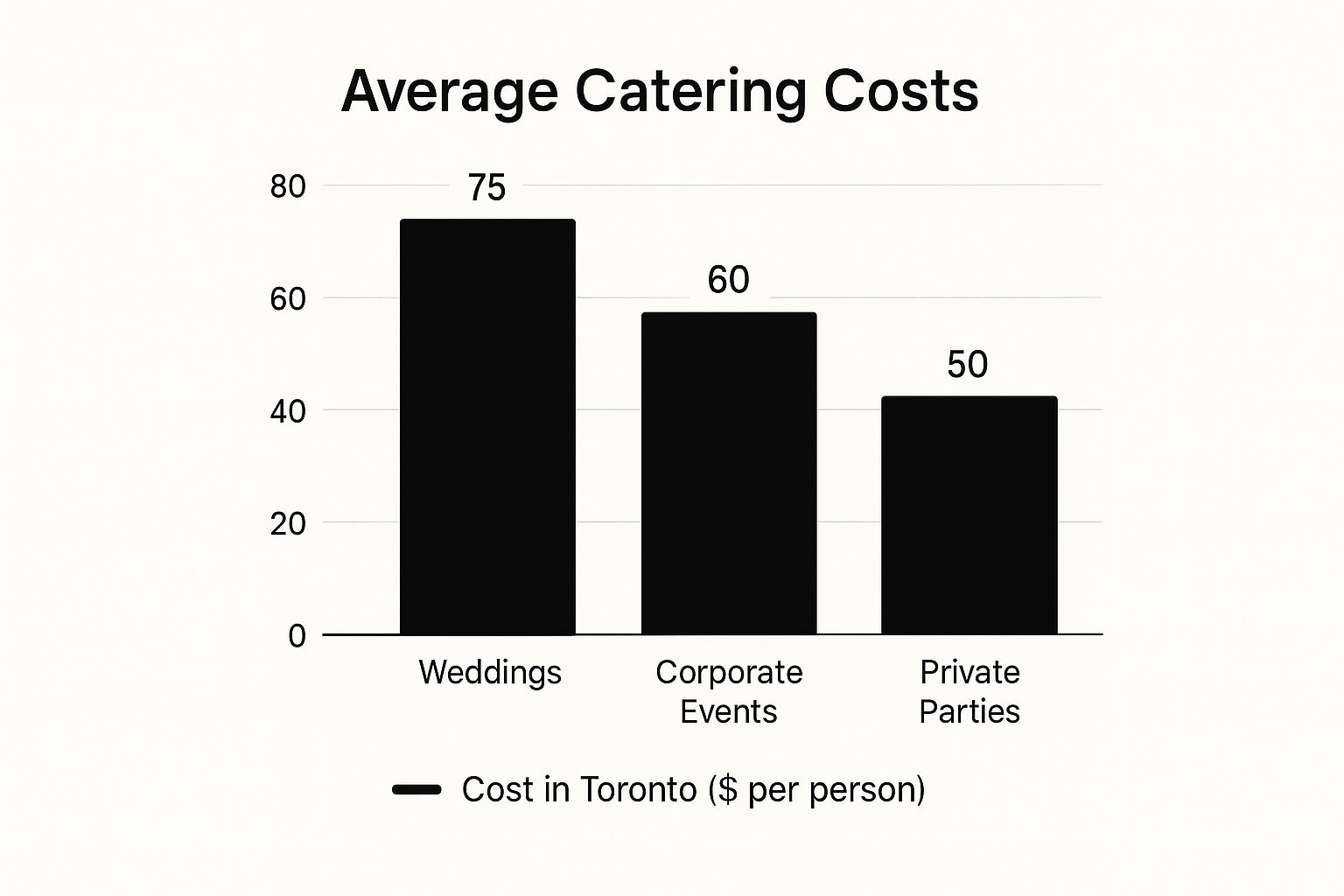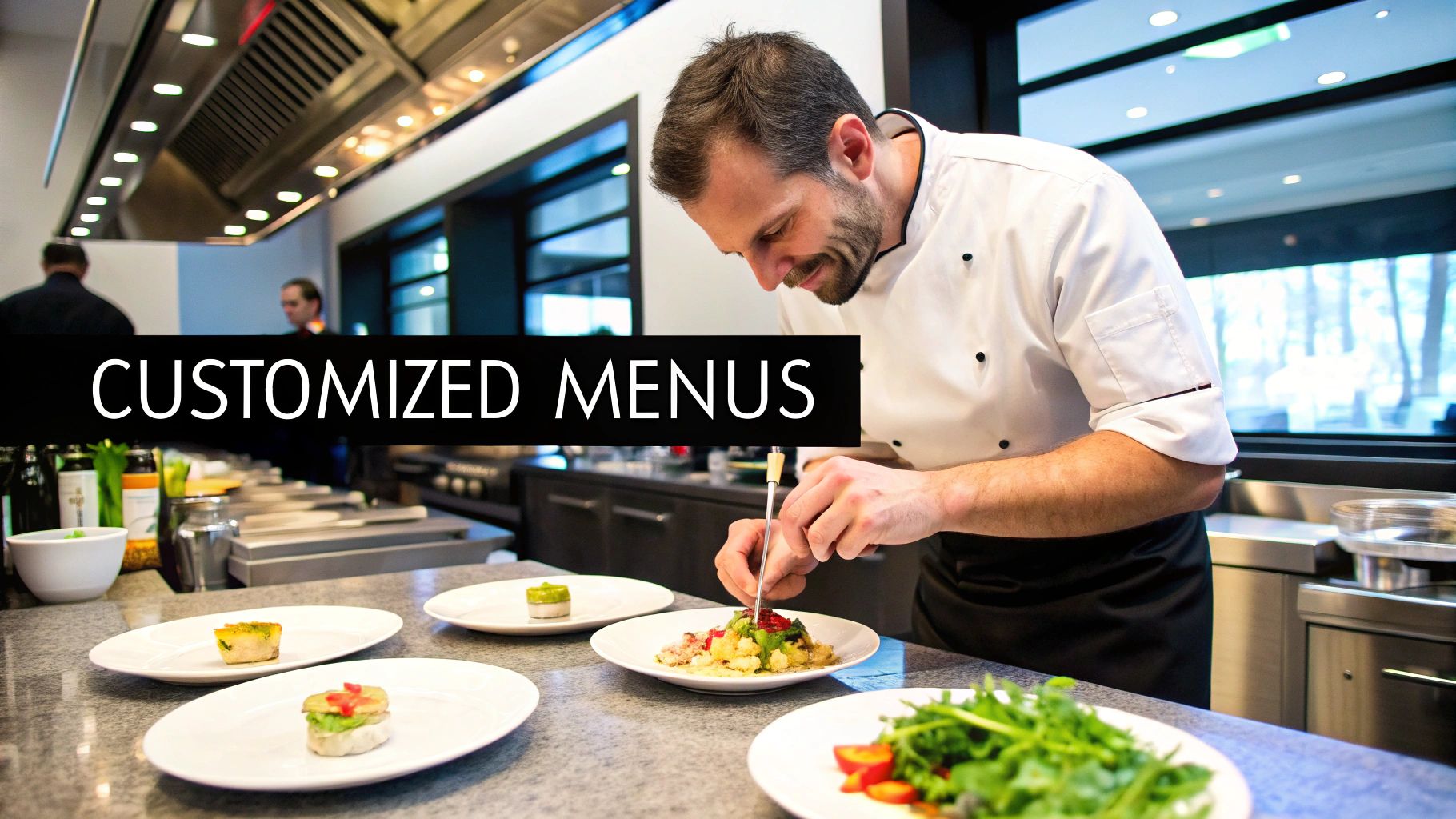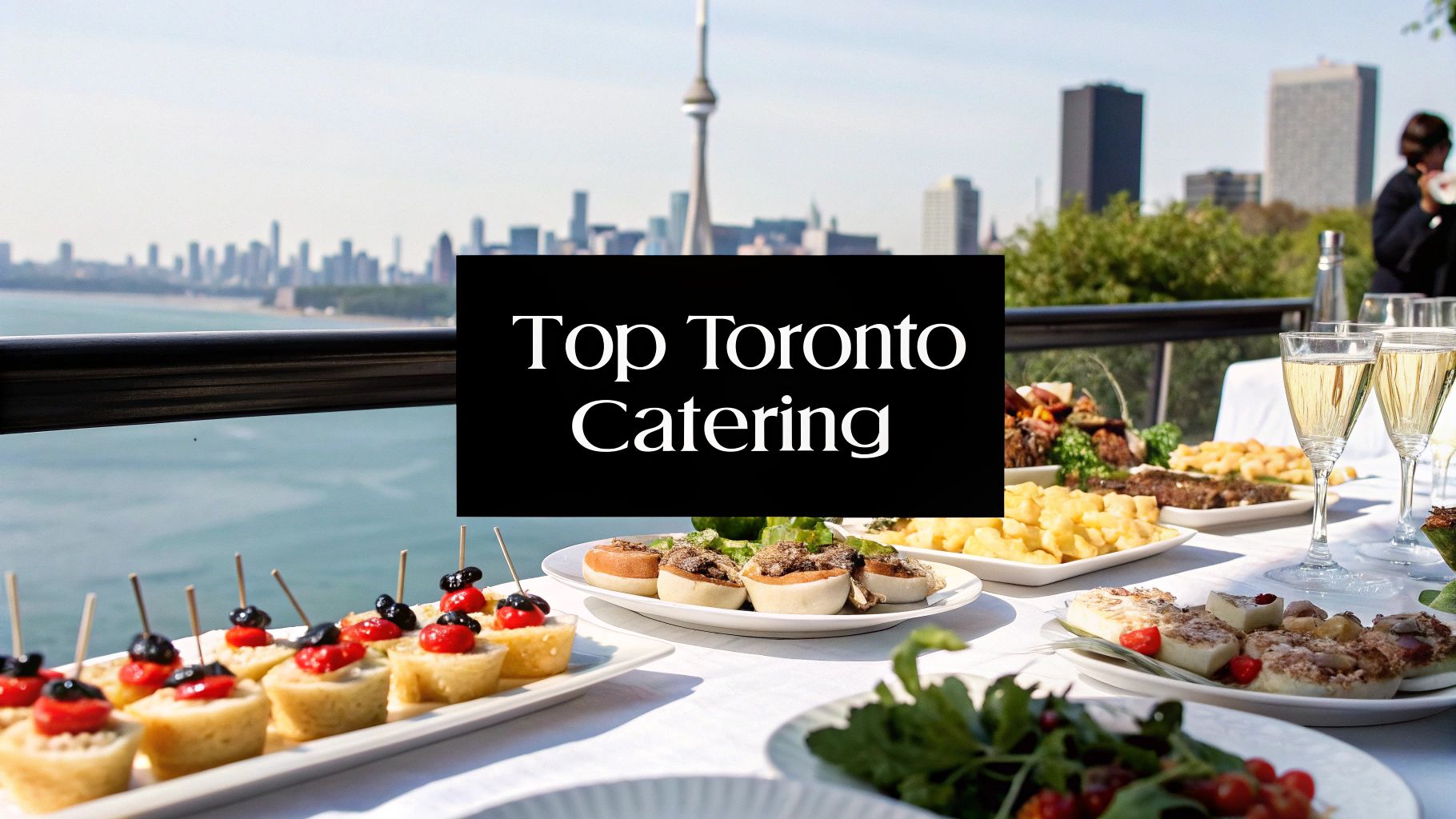Choosing the right caterer can make or break your event. In a city bursting with culinary talent, narrowing down the best fit among catering companies in Toronto often feels like searching for a needle in a haystack. This guide will walk you through every step—whether you’re planning a wedding, a corporate launch, or an intimate dinner party—to ensure outstanding food and seamless service.
How to Navigate Toronto’s Catering Scene
Toronto’s food culture is a vibrant tapestry of global flavours and regional twists. Here, your caterer isn’t just someone who delivers trays; they set the tone, pace, and overall vibe. Think of them as the ‘culinary conductor’ of your event, seamlessly blending menu choices with décor, timing, and guest experience.
The Canadian catering industry sits at about CAD $3.1 billion, with 2,051 of the nation’s 4,805 registered caterers based in Ontario. No single company holds more than a 5% market share, which means you can choose from countless niche specialists and boutique providers. For a deeper dive into these figures, check out the latest report from IBISWorld.
Defining Your Event Vision First
Before you request quotes, get crystal clear on what your event really needs. Outlining your non-negotiables up front helps you zero in on caterers who fit your style, budget, and logistical requirements. Ask yourself:
-
Event Type and Formality
Will it be a black-tie gala with plated service or a casual office lunch with buffet stations? The answer shapes everything from menu complexity to staff attire. -
Guest Profile
Are you feeding executives accustomed to fine dining or a mixed group with diverse dietary needs? Understanding preferences—vegetarian, gluten-free, kid-friendly—avoids last-minute panics. -
Venue Logistics
Does your location boast a full kitchen, or will the caterer need to bring in mobile equipment? Site access, power sources, and parking all factor into what they can realistically deliver.
A great caterer does more than serve dishes; they become a strategic ally in bringing your vision to life.
Getting the Food Just Right: A Look at Menus and Custom Options

The menu is the heart and soul of any event. But let’s be honest, a great culinary experience is about more than just a list of dishes. When you're looking at catering companies in Toronto, think of the menu as the blueprint for your event's entire vibe. The right food, served the right way, can single-handedly elevate an occasion from just another get-together to something truly memorable.
It’s not just what you serve, but how you serve it. The service style you pick really sets the tone and dictates the energy in the room. Each format creates a completely different experience, so matching the style to your event’s goals is the first, and most important, step.
Plated, Buffet, or Stations? Choosing Your Service Style
Before you even think about specific dishes, you need to decide on the flow. A formal corporate gala has very different needs than a casual summer wedding, and the service style should reflect that.
Let's break down the most popular options:
-
Plated Dinners: This is your classic, formal choice. Guests are served individual, pre-portioned courses right at their tables. It creates a sophisticated, restaurant-like atmosphere that’s perfect for weddings and awards ceremonies where you want everyone served at the same time.
-
Buffet Service: A much more relaxed and interactive setup. Buffets let guests help themselves from a beautiful spread of dishes. This naturally encourages mingling and gives people more choice, making it a fantastic fit for corporate lunches or large, casual parties.
-
Food Stations: This is the most dynamic and engaging option by far. Think of it as a mini food market just for your guests. You can have different stations set up around the room—maybe a taco bar, a pasta station, or even an oyster bar. It gets people moving, talking, and trying new things.
Why Menu Customization Is Everything
Standard menus are a great starting point, but the best caterers in Toronto are the ones who excel at customization. Your event is one-of-a-kind, and your food should be, too. True customization lets you weave your personality, theme, or brand directly into the dining experience.
A caterer who offers real flexibility is more than just a food supplier; they're a creative partner. They should be genuinely excited to work with you to build a menu that tells your story. This could mean anything from incorporating a beloved family recipe into a wedding menu to creating custom-branded desserts for a corporate launch.
True customization isn't just about swapping out the green beans for asparagus. It’s about a caterer’s willingness and ability to build a menu from the ground up that perfectly fits your event’s theme, seasonality, and unique story.
To see how flexible a caterer really is, ask them some specific questions. Don't just stick to their pre-set options. Ask if they can source ingredients from local Ontario farms or design a menu around a specific theme, like a fall harvest. How they respond to these creative challenges will tell you everything you need to know about their passion and expertise. A great way to get ideas is to see how a diverse menu can be adapted; for instance, checking out the Shawarma Moose menu can show you all the different ways you can present Middle Eastern flavours, from wraps to bowls and platters.
The Tasting: Your Final Quality Check
Finally, there's the tasting. This is your chance to make sure the quality is really there and to lock in your final choices. Think of it as the ultimate taste test—it’s where the menu goes from a document on a screen to an actual plate of food. For any large or important event, this step is absolutely non-negotiable.
When you're at the tasting, you're looking for more than just good flavour.
-
Presentation: Does the food look as amazing as it tastes? The visual appeal is a huge part of the experience.
-
Ingredient Quality: Can you taste the freshness? Are the vegetables crisp and vibrant? Does the protein taste high-quality?
-
Portion Sizes: Are the portions right for your event? What looks like a delicate tasting portion might not be enough for a full dinner.
This is your time to give honest, direct feedback. A true professional will welcome your thoughts and use them to tweak the dishes until they're absolutely perfect for the big day. It's the final step in turning your vision into a delicious reality.
Understanding Catering Prices and Finding Value
Let's talk about the money side of things. Trying to figure out catering costs in Toronto can feel a bit like reading a map without a legend. You'll see per-person rates, package deals, and custom menus, and it's easy to get turned around. The real secret to getting great value isn't just about chasing the lowest number; it's about knowing precisely what that number gets you.
Think of it like buying a car. The base price looks great on the billboard, but once you add the things you actually want—the better sound system, the winter tires—the final cost tells a different story. A caterer’s initial quote can be the same. That attractive per-person price might not include everything, and hidden fees can quickly throw your budget out of whack if you’re not careful.
Decoding Common Pricing Structures
Most Toronto caterers use one of a few standard ways to build a quote. Getting familiar with them is the first step to making a smart comparison. Each approach has its pros and cons, depending on what kind of event you're hosting.
Here’s a quick rundown of what you’ll likely come across:
-
Per-Person Pricing: This is the most straightforward model. You pay a set price for each guest, which usually covers the food. The key here is to ask what else is included—does it cover basic linens or soft drinks, for example?
-
Tiered Packages: You'll often see packages labelled something like Bronze, Silver, and Gold. These bundle food, drinks, and sometimes staff into different tiers. They make decisions easier, but you need to read the fine print to make sure you're not paying for extras you don't actually need.
-
Custom Quotes: For more unique or upscale events, a caterer will likely build a quote from scratch just for you. This gives you total flexibility, but it also means you have to pay close attention to every single line item to keep track of the costs.
To give you a clearer picture, this chart breaks down how average per-person costs can shift depending on the type of event in Toronto. It’s a great starting point for your budget.

As you can see, weddings typically have the highest per-person rates because of all the moving parts involved. Corporate events and private parties often fall into a more moderate range.
Watch Out for Hidden Costs and Extra Fees
The first number you see is rarely the last. Finding true value means sniffing out all the potential add-ons to understand the "all-in" price. A seemingly cheaper quote from one caterer could easily end up costing more than a competitor's once all the extra fees are tacked on.
The best way to compare apples to apples is to ask for a fully itemized proposal. This transparency is your best friend—it lets you see exactly where your money is going and helps you dodge any nasty surprises later.
Before you sign on the dotted line, make sure you ask about these common extra charges:
-
Staffing and Labour: Are servers, bartenders, and kitchen staff included in the price? Find out the guest-to-staff ratio and whether overtime charges apply.
-
Rentals: This can be a big one. It covers everything from tables, chairs, and linens to the plates, glassware, and cutlery.
-
Service Fees and Gratuities: Many caterers add an administrative or service fee (often 18-22%) to the total bill. This is usually separate from any tip you might give the staff.
-
Delivery and Setup: Getting everything to your venue costs money. These fees can change based on how far they have to travel and how complex the setup is.
-
Specialty Items: Little things can add up. Think cake-cutting fees, corkage fees if you supply your own booze, or extra charges for a late-night food station.
Finding Value in the Toronto Market
Location matters, especially when it comes to corporate events. To illustrate, here’s a look at how catering costs for a standard corporate lunch can vary across different Toronto neighbourhoods.
Sample Catering Cost Breakdown per Person in Toronto
This table illustrates potential per-person catering costs across different Toronto neighbourhoods for a standard corporate lunch event, helping you budget accordingly.
|
Neighbourhood |
Low-End Cost per Person |
High-End Cost per Person |
Key Considerations |
|---|---|---|---|
|
Financial District |
CAD $28 |
CAD $45 |
Higher operational costs, parking, and premium venue demands drive up prices. |
|
Yorkville |
CAD $30 |
CAD $50+ |
Associated with luxury and high-end service, reflecting in the catering costs. |
|
Liberty Village |
CAD $25 |
CAD $40 |
A trendy, competitive area with a mix of creative and tech firms. |
|
North York |
CAD $22 |
CAD $35 |
Generally more affordable, with lower delivery and overhead costs. |
These differences often come down to local economics and logistical challenges. It’s an interesting tidbit that even though Toronto businesses spend about CAD $12,000 a year on lunch catering, a surprising 65% report being unhappy with the result. This often stems from rushed planning, which leads to overspending. You can find more insights about Toronto's corporate catering trends and learn how a little strategic planning can make a huge difference.
In the end, finding the best value among catering companies in Toronto is a balancing act. It's about so much more than the sticker price—it’s about the quality of the food, the professionalism of the service, the caterer's reliability, and their ability to bring your vision to life without a hitch.
How to Vet Service Quality and Professionalism

Let's be honest: even the most incredible food can be ruined by terrible service. When you hire a catering company in Toronto, you’re not just paying for a meal; you’re investing in an experience for your guests. The servers, bartenders, and managers on the ground are the face of your event, and their professionalism is every bit as important as the flavour of the food.
Think of it like hiring someone to renovate your kitchen. You wouldn't just look at glossy photos of finished projects. You’d ask for references and find out how they handle things when problems pop up. You need to apply that same level of diligence here.
This whole process starts with your very first phone call or email. How quickly and clearly do they respond? Their initial professionalism is a huge clue about how they’ll perform on the day. Slow email replies and vague answers are red flags for disorganization down the road.
Beyond the Five-Star Reviews
Online reviews are a great place to start, but they don't always tell the whole story. A glowing five-star review might rave about the food but conveniently forget to mention that the staff was slow to clear empty plates or never refilled the water glasses. To get the real picture, you have to dig a bit deeper.
Look for patterns. Do you see multiple people mentioning a specific server by name for their fantastic attitude? Or do several reviews hint at communication issues in the weeks leading up to the event? These recurring themes are far more telling than a single great review or an isolated complaint.
Here’s what to look for when you're reading between the lines:
-
Problem Resolution: Find reviews that talk about how the caterer handled a curveball, like a last-minute guest addition or an issue with the venue's power. A team that can think on its feet is priceless.
-
Staff Demeanour: Pay close attention to words like "friendly," "attentive," and "proactive." These are clear signs of a well-trained team that genuinely cares.
-
Consistency: A long track record of positive, detailed reviews suggests a reliable and well-managed operation—a crucial trait for the best catering companies in Toronto.
A truly professional catering team anticipates needs before they even arise. They don't just react to problems; they have contingency plans ready to go, ensuring your event feels seamless, no matter what surprises pop up.
Asking the Right Questions
Once you’ve shortlisted a few caterers, it’s time to ask some direct questions that get to the heart of their professionalism and preparedness. These go way beyond the menu and pricing. An experienced caterer will have confident, ready-to-go answers.
Your goal is to understand their standard operating procedures. A team that has already thought through these details is a team you can trust. For instance, you can learn about the top reasons Shawarma Moose is a go-to catering service in Toronto to get a sense of what operational excellence looks like.
Here are some essential questions to have in your back pocket:
-
Staff-to-Guest Ratio: What’s your standard ratio of servers to guests for an event like mine? For a sit-down dinner, a 1:10 or 1:12 ratio is a good benchmark, while a buffet can often work with fewer staff.
-
Staff Training: How are your event staff trained? Are they full-time employees who know your standards, or are they temporary agency hires?
-
On-Site Leadership: Who will be my point person on the day of the event? Can I meet them beforehand?
-
Venue Experience: Have you worked at my venue before? If not, do you plan on doing a site visit ahead of time?
-
Contingency Plans: What’s your backup plan for something like bad weather at an outdoor event or an oven that decides to stop working?
A caterer’s ability to answer these questions with confidence will tell you everything you need to know about their experience and ability to make your event a massive success.
Managing Dietary Needs and Special Requests
These days, handling dietary needs is no longer a polite courtesy—it’s an absolute must-have for any successful event. When you're looking at different catering companies in Toronto, how they manage special requests is a dead giveaway of their overall quality and professionalism. It’s not just about having a sad-looking vegetarian lasagna off to the side; it's about making sure every single guest feels seen, safe, and truly taken care of.
Think of a caterer's approach to dietary needs as a stress test for their entire kitchen. A company that nails this shows you they have incredible attention to detail, crystal-clear communication, and some serious culinary chops. They’re not just trying to avoid allergens. They're aiming to create a meal for a guest with restrictions that’s every bit as delicious and exciting as what everyone else is eating.
Clearly Communicating Guest Requirements
It all starts with getting the right information from your guests. When you send out invites or collect RSVPs, don't be vague. A simple "any dietary needs?" will get you a mixed bag of responses. Instead, give people a clear checklist to work from.
A good list covers the most common bases:
-
Vegetarian and Vegan: A complete absence of meat or all animal products.
-
Gluten-Free: Avoiding wheat, barley, rye, and other sources of gluten.
-
Common Allergies: Be specific and ask about nuts, dairy, shellfish, and soy.
-
Religious Dietary Laws: Such as halal or kosher requirements.
Once you’ve got this info, your next job is to pass it along to your potential caterer in a way that makes sense. Don’t just email them a list of names and hope for the best. A truly skilled caterer will want to know how severe the allergies are and will have a solid system for tracking which meal goes to which guest. This kind of proactive planning is a sure sign you're dealing with one of the best catering companies in Toronto.
Vetting a Caterer's Handling of Dietary Needs
Let’s be honest, not all caterers are created equal when it comes to handling complex dietary restrictions. You need to dig a little deeper and ask pointed questions to understand their process and avoid any dangerous mix-ups on event day. Their answers will tell you everything you need to know about their experience and commitment.
You can spot a truly expert caterer not by their standard menu, but by how they create incredible dishes for guests with the most specific needs. That dedication to inclusivity is what separates a good caterer from a great one.
Here are the non-negotiable questions to ask:
-
What is your process for preventing cross-contamination in the kitchen?
You’re looking for specifics here—separate prep stations, colour-coded utensils, dedicated cooking protocols. A fuzzy "oh, we're careful" just doesn't cut it. -
How do you label dishes on a buffet or at food stations?
Every single dish should have a clear, easy-to-read label listing major allergens, not just the "special" items. This is basic food safety. -
How do you make sure the right special meal gets to the right guest during a plated dinner?
They should have a foolproof system, whether it's coded place cards or seamless communication between the event manager and the serving team.
This level of detail is becoming a major factor in the industry. The Canadian catering sector, which saw its market size dip from USD $4.15 billion to USD $3.8 billion after the pandemic, is now bouncing back by focusing on these kinds of high-value services. Caterers in hubs like Toronto are setting themselves apart with innovative, customizable menus that put these needs front and centre. To learn more about this trend, you can discover more insights about the Canadian catering market on Business Research Insights.
At the end of the day, you're looking for a partner who doesn't see dietary restrictions as a problem, but as a chance to show off their culinary creativity. For a great example of how this can be done without sacrificing flavour, take a look at how a custom-built bowl for dietary restrictions can be adapted to be gluten-free, vegetarian, or vegan and still be a fantastic, satisfying meal.
Making Your Final Choice and Signing the Contract

You’ve done the hard work—tastings are complete, references have been checked, and you’ve narrowed down the field to a couple of top contenders. Now for the final, crucial step: making a confident decision and getting it all in writing. This is the moment you shift from tasting menus to sealing the deal.
That catering contract isn’t just a piece of paper; it’s the official blueprint for your event. Think of it as the script everyone will follow on the big day. It locks in every promise and clarifies every responsibility, protecting both you and the caterer. It’s tempting to skim and sign, but rushing this part is where easily avoidable problems begin.
Time to Compare, Head-to-Head
Before you make that final call, it’s a smart move to lay out all your findings in a simple, objective way. A quick comparison chart can help you cut through the noise and evaluate your top choices based on facts, not just a gut feeling. This approach makes sure you haven't overlooked a key detail in the excitement.
I always recommend a simple table to put everything in black and white. Be honest and thorough as you fill in the details for your top two or three catering companies in Toronto.
Caterer Selection Final Checklist
This quick-reference table helps you compare your top catering candidates against crucial selection criteria before making your final decision.
|
Evaluation Criteria |
Caterer A |
Caterer B |
Caterer C |
|---|---|---|---|
|
Menu Quality & Taste |
Excellent, creative |
Good, traditional |
Very good, modern |
|
Customization Flexibility |
Highly flexible |
Standard options |
Moderately flexible |
|
All-Inclusive Price |
$X,XXX |
$Y,YYY |
$Z,ZZZ |
|
Responsiveness |
Immediate replies |
24-48 hour replies |
Varies by day |
|
Dietary Handling |
Dedicated protocols |
Separate meals |
Notes on menu |
|
Staff Professionalism |
Very impressive |
Professional |
Friendly but casual |
|
Venue Experience |
Worked there 5x |
Never worked there |
Worked there 1x |
After filling this out, one caterer usually emerges as the clear winner. Now, it's time to get that contract sorted. Don't let the legal jargon intimidate you; understanding the key parts is your final layer of protection.
What to Look for in the Fine Print
Honestly, a detailed, comprehensive contract is a great sign. It shows you’re working with an experienced professional who leaves nothing to chance. If a caterer just hands you a simple one-page agreement, that’s a major red flag. A proper contract is there to make sure everyone is on the same page and to prevent any drama on the day of the event.
A well-written contract is your best insurance policy against event-day surprises. It translates verbal agreements into legally binding commitments, ensuring every detail from the number of servers to the brand of sparkling water is exactly as you planned.
When you get that document, grab a coffee and pay extra attention to a few key sections. These are the areas where misunderstandings are most likely to happen, so getting them right is non-negotiable.
The Can’t-Miss Clauses
-
Payment Schedule: This should spell out the total cost, how much the deposit is to lock in your date, and the due dates for every payment after that. You need to know exactly when that final balance is due.
-
Cancellation Policy: Life is unpredictable. What happens if you have to cancel or postpone? A fair policy will have a tiered refund system based on how close the cancellation is to the event date.
-
Final Guest Count Deadline: Caterers need a solid headcount to order the right amount of food and schedule staff. The contract will have a specific date—usually 7-14 days out—when you have to give them your final number. After that date, you'll be billed for that number even if a few people drop out.
-
Liability Insurance: This is an absolute must-have. The contract needs to state that the caterer has proper liability insurance. This protects you if there’s an accident involving the catering staff or their gear.
-
Scope of Services: This is the nitty-gritty. It should list everything: the complete menu, how many staff will be there, the hours they'll work, and what rentals (linens, plates, glassware) are included. It should also define their setup and cleanup duties. Make sure this section perfectly matches all your conversations.
Don’t ever hesitate to ask questions or suggest small changes. Things like payment dates or minor menu tweaks are often negotiable. A true partner will be happy to work with you to create a transparent agreement that makes everyone feel secure. It’s the first step to a fantastic, stress-free event.
Frequently Asked Questions About Toronto Catering
Planning an event in Toronto often feels like juggling too many plates—timelines, budgets, guest lists, special requests. Here’s a down-to-earth FAQ that walks you through the knottiest questions, from when to book to how much you’ll really pay. Think of it as your roadmap to a smooth, stress-free celebration.
How Far in Advance Should I Book a Catering Company in Toronto
Big weddings and peak seasons book up fast—imagine trying to snag concert tickets at the last minute. Aim for 9–12 months ahead if you’re hosting a major affair in June or September.
For smaller gatherings—corporate luncheons or backyard birthdays— 1 month's notice usually does the trick.
P.S Shawarma moose only requires 24-hour notice and can deliver.
Getting in early doesn’t just lock in your date. It opens the door to menu tweaks, custom décor and better pricing. In other words, you’ll thank yourself later when everything falls into place.
What Is the Average Catering Cost per Person in Toronto
Breaking down costs can feel like reading a menu in another language. Here’s a quick snapshot:
-
Corporate lunches: CAD $25–$45 per guest
-
Multi-course wedding dinners: CAD $100–$250 per guest
Always ask for an itemized quote so you know exactly what’s covered—and what’s extra. Common add-ons include:
-
Staffing and labour costs
-
Rental fees for linens and equipment
-
Service charges and gratuities
-
Delivery and setup expenses
A handy tip: many caterers offer seasonal specials during off-peak months. A well-timed ask might score you up to 15% off your bill.
Do Toronto Caterers Provide Alcohol and Bartending
Think of licensed caterers as full-service hosts. Most hold the necessary permits to supply and serve alcohol, complete with insured bartenders.
If you’d rather bring your own wine or beer, some companies will handle corkage and service—but always double-check:
-
Licensing requirements
-
Corkage fees
-
Liability coverage
Bartending packages often include glassware, mixers and garnishes—so you arrive at your event with one less thing to worry about.
“Certified staff and proper insurance are essential when serving alcohol at any event.”
What Happens If My Guest Count Changes
Guest lists can shift like spring weather. Here’s a typical timeline:
|
Guest Count Timeline |
Requirement |
Billing Policy |
|---|---|---|
|
14+ Days Out |
Estimated headcount |
No charges yet |
|
7–14 Days Out |
Final guest list due |
Billed for this number |
|
0–6 Days Out |
Changes accepted |
Additional fees apply |
Most caterers lock in numbers 7–14 days before your event. If attendance dips after that, you’ll still pay based on the final headcount—so clarify any minimum-spend rules up front.
A flexible caterer who accommodates last-minute tweaks can make all the difference in keeping guests happy and stress levels low.
Ready for stress-free corporate catering in Toronto? Choose Shawarma Moose for on-time delivery, flexible menu options, and professional service. Learn more and get your customized quote today at Shawarma Moose Catering.

